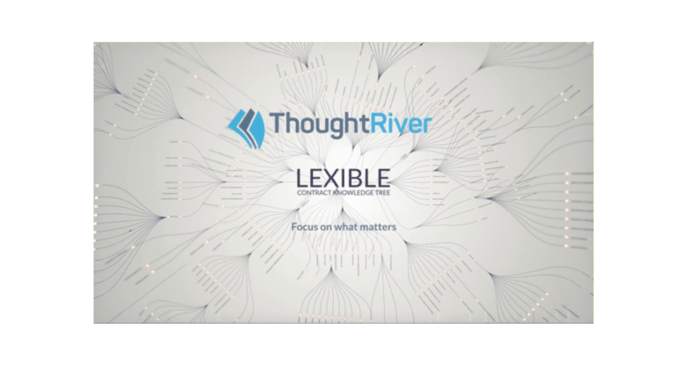
Legal AI company, ThoughtRiver, which focuses on contract pre-screening, has formally launched its ‘Lexible’ universal contract language description system, to help standardise the interpretation and review of legal documents.
The system has been developed to immediately produce the questions you are most likely to ask about each sort of contract that is before you – and then find the answers – all in one interconnected process.
Sounds interesting, but how does it work? Here is how UK-based ThoughtRiver explains it: ‘The Lexible contract description framework is an ontology of meaning-based properties that together encapsulate the complex legal logic and relationships present in an agreement.’
‘It includes thousands of individual questions that together build a granular picture of obligations and rights within a document,’ they add.
At first glance that may still seem a bit esoteric. Basically what they have done is look at contract language and broken down all the longer bits and pieces of legal meaning into smaller, more easily definable chunks. They’ve then trained their NLP system to look for those terms and respond to them using this framework.
And, perhaps an even more day to day way of looking at this is to say they’ve turned all the various parts of a contract into specific Lego bricks. They can then find those in a document and give you a clear response as to what Lego bricks are there and what they mean.
Or, to return to ThoughtRiver: ‘Each property on Lexible is expressed as a question (e.g. Does the counter-party have a right to assign this contract to anyone?)’
‘ThoughtRiver’s pre-screening tool automatically determines which properties are relevant for your contract type and answers all associated questions for you. It then tells you how risky those positions are against your playbook,’ the company concludes.
One of the challenges AI doc review often faces is that is doesn’t reduce the need to figure out what questions to ask, nor even when data is found can most systems automatically find the answers to those questions. Just finding dozens of clauses is helpful – but it has a limited benefit on its own, hence the development of Lexible.
Clearly the reasons for doing things the Lexible way are: greater efficiency, better and quicker visibility of key legal data, and the ability to measure risk inside a legal document via a structured framework.
To build Lexible their data scientists examined 4 million legal documents to find standard elements that could respond to this Q&A approach.
Tim Pullan, founder of the company, commented: ‘The universal design of Lexible is its true power, with the potential to become the standard contract description language. Ultimately, this will help people and businesses understand the complex agreements they are frequently asked to enter into.’

They have also launched Lexible Studio, which is a toolkit that allows companies to extend Lexible to meet their own specific needs. And they’ve also created a Lexible partner programme to let law firms collaborate in the offering.
Matt Meyer, CEO of UK law firm Taylor Vinters, which works with ThoughtRiver, said: ‘Lexible is a fine example of AI having a positive and very tangible impact on the way not only lawyers work, but the ease with which non-lawyers understand the contracts they are getting into.’
While Joe Stephenson, a partner at another UK law firm, Shoosmiths, and who heads up the law firm’s commercial contract review and negotiation service – Spotlight, said: ‘Integrating ThoughtRiver’s AI into Spotlight not only has enhanced the speed and precision of our contract reviews, but we’ll be imminently launching a new service – Spotlight AI – enabling our clients…to carry out their own commercial contract reviews, saving three to four hours of review time per contract.’
This is nice and one would whish it would work, but it won’t in many cases. Reasons: contradictory/changing statutes and case law. For instance, often a question like “Does the counter-party have a right to assign this contract to anyone?” cannot be sufficiently and correctly answered in full simply by reading the terms of the contract, as it may be that a statue or some case law may say that, concerning the contractual subject matter, any assingments are prohibited. Then an assignment clause would be invalid. But the danger is then that the software – which does not know the law and cannot do legal interpretation – answers “yes” to this question even though the legally correct answer may be no. So, this may be a nice tool as a start but you still need lawyers (alas) for the bigger picture.